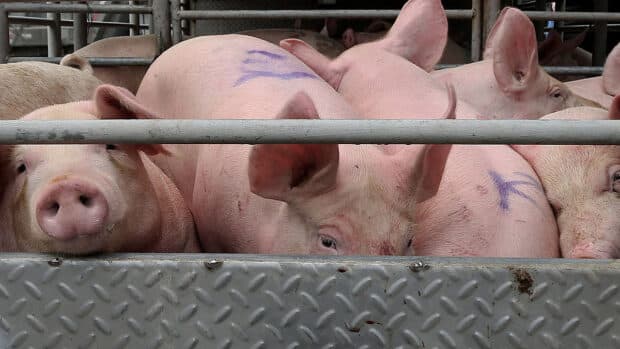Bohol town under state of calamity due to ASF

TAGBILARAN CITY — The municipal council of Ubay in Bohol province declared a state of calamity due to cases of African swine fever (ASF) and its impact on the local hog industry.
The Municipal Disaster Risk Reduction Management Council led by Ubay Mayor Constantino Reyes recommended the declaration to enable the local government to use its calamity funds to assist local hog raisers.
The state of calamity declaration was made on Wednesday, January 8.
Municipal Agriculturist Marianito Doydora said at least 127 pigs in three barangays – Los Angeles, San Francisco, and Bulilis – died of ASF as of Wednesday.
The outbreak resulted in losses amounting to P100,000.
Article continues after this advertisement
The three barangays have around 650 households who engage in backyard hog raising.
Article continues after this advertisement
READ: ASF cases slightly up by end of December 2024 – BAI
Doydora said it was the first time ASF hit Ubay, a first-class municipality with 44 barangays.
“Having cases of ASF is dangerous, especially since this is the first-time we experienced such a problem. We need to conduct an information drive (so people will be guided on what to do),” he said.
Bohol Gov. Erico Aristotle Aumentado on Jan. 7 issued two executive orders to curb the spread of ASF.
These were Executive Order 57 or the immediate moratorium of “boar-for-hire activities” for six months, and Executive Order 58, which mandates the accreditation of hog traders to ensure proper monitoring and regulation of hog-related activities.
Aumentado said the boar-for-hire has been identified as one of the primary causes of the recent ASF outbreak in central Bohol.
“We have spent millions to save the livelihood of our farmers because it is very important for the development of our economy. We also see that the results of the initiatives that have been made are positive. Because of this, I urge everyone to take seriously the concern and the protection of our hog industry, ” he said.
ASF has now affected nine barangays in five municipalities in the province.
The first case of ASF in Bohol was detected in San Vicente in Pilar town in August 2023. In April 2024, it spread to Dauis town on Panglao Island.
After seven months, in November 2024, Barangay San Vicente in San Miguel town was infected with ASF.
A month later, the ASF spread to Batuan town.
READ: DA urged to focus on African swine fever in 2025 budget
The ASF also spread to two barangays in Carmen town – Buenos Aires and Nueva Vida Norte; and Barangay La Suerte in Pilar town.
Authorities still prohibit the entry to Bohol of pork and pork products from other provinces with reported cases of ASF to protect the province’s P6-billion livestock industry.
Dr. Meydallyn Paman, officer-in-charge of the Office of the Provincial Veterinarian, reported that a total of 1,216 pigs have been culled to control the spread of the virus.
Paman also facilitated the action planning on boar-for-hire and hog trading accreditations, including a master listing for boar-for-hire operators.
According to the National Meat Inspection Service, ASF is a highly contagious viral disease that affects pigs, warthogs, and boars. It causes pigs to have high fever and lose their appetite, and causes hemorrhages in the skin and internal organs.
Pigs die in a span of two to 10 days upon affliction. There is no known vaccine yet against ASF.
Health officials reiterated that ASF does not pose any threats to human and that other pork products from infected areas were safe to eat.